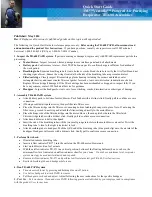
www.trioniaq.com
ATS Series
10
I n s t a l l a t i o n , O p e r a t i o n , & S e r v i c e M a n u a l
output shall turn to OFF status, programs overrided.
Press MANUAL again to switch timer status to AUTO.
Timer’s output shall continue maintaining OFF. Timer
shall resume its automatic operation when next program
(event) calls for ON (with next opposite set point).
Condition 2: When timer’s status is OFF, press MANUAL
key to move indicator from AUTO to ON. Timer status
shall turn to ON status, programs overrided. Press
MANUAL again to switch timer status to AUTO. Timer’s
output shall continue maintaining ON. Timer shall
resume its automatic operation when next program
(event) calls for OFF (with next opposite set point).
Random Startup Override: Press and hold DAY key,
and then press MIN key. There shall be a symbol
“nn” that shows on the left corner of the LCD screen
to indicate that this override is executing. When this
override is being executed, the original programs will
be stopped, and once every 10 to 120 minutes, timer
shall automatically turn its output to ON status. Once
again, pressing and holding DAY key and then MIN
key shall terminate this override.
Routine Maintenance
Washing Frequency
The frequency that the collected dirt is to be washed
from the unit depends upon the type and amount
of contaminate in the air being cleaned. Greasy
contaminate tends to harden after collection and
should be washed often. Likewise, units operating
under extremely heavy loads should be washed more
often as a large build-up of collected material will
have a tendency to “blow-off” if permitted to remain on
the collecting elements for long periods of time. It is
recommended to wash at least once a week, for most
applications except kitchen exhaust. Kitchen exhaust
applications should be washed daily. Schedules may
then be altered as needed after visual examinations
of the collected material contained on the ionizing-
collecting cells. Also, daily washing is not unusual
for units operating on heavy welding fume, kitchen
exhaust hoods or similar applications.
Detergent
Effective washing is dependent upon detergent. The
detergent reservoir level should be checked on a routine
basis, a minimum tank level established. Never let the
tank run dry which will damage the pump. The inside
of the tank should be kept clean, free from dirt and
foreign objects. The detergent as supplied by TRION,
is formulated specifically for electronic air cleaners and
should not be diluted when using a pre-mix solution.
For a concentrated mix, dilution will be required when
filling the tank. If substitutes are used, they must be
approved by TRION (so as to not void the warranty)
and should be safe for use in ventilation systems.
Electrical Operation
The front of the control panel has indicating lights for
the power supplies. Check the lights daily to ensure
that the electronic air cleaners are operating.
Preventative Maintenance
Washing frequency – as required. The washing
schedule and detergent reservoir level as outlined
under routine maintenance is again referenced here as
excessively large contaminant buildup on the collecting
elements invites down time. Established routine
washing is a preventative maintenance requirement.
Fire control system - Every 4 to 6 months or as required.
Inspection, cleaning and servicing of the fire extinguishing
system and all listed exhaust hoods shall be completed
by properly trained and qualified personnel.
All actuation components, including remote manual
pull stations, mechanical or electrical devices,
detectors, fire-actuated dampers, etc., shall be
checked for proper operation in accordance with the
manufacturers listed procedures. In addition to these
requirements, the specific inspection requirements of
the applicable NFPA standard shall also be followed.
If required, certificates of inspection and maintenance
shall be forwarded to the authority having jurisdiction.
Grease removal devices and components – every
4 to 6 months. All shall be completely cleaned at
frequent intervals prior to surfaces becoming heavily
contaminated with grease or oily sludge. It may be
advantageous to remove items, such as impingers,
metal mesh filters, ionizing-collecting cells or other
grease removal devices for cleaning. When a
cleaning service is used, a certificate showing date
of inspection and/or cleaning should be maintained
on the premises. Areas not cleaned will be noted.
Flammable solvents or other flammable cleaning aids
shall not be used.


































